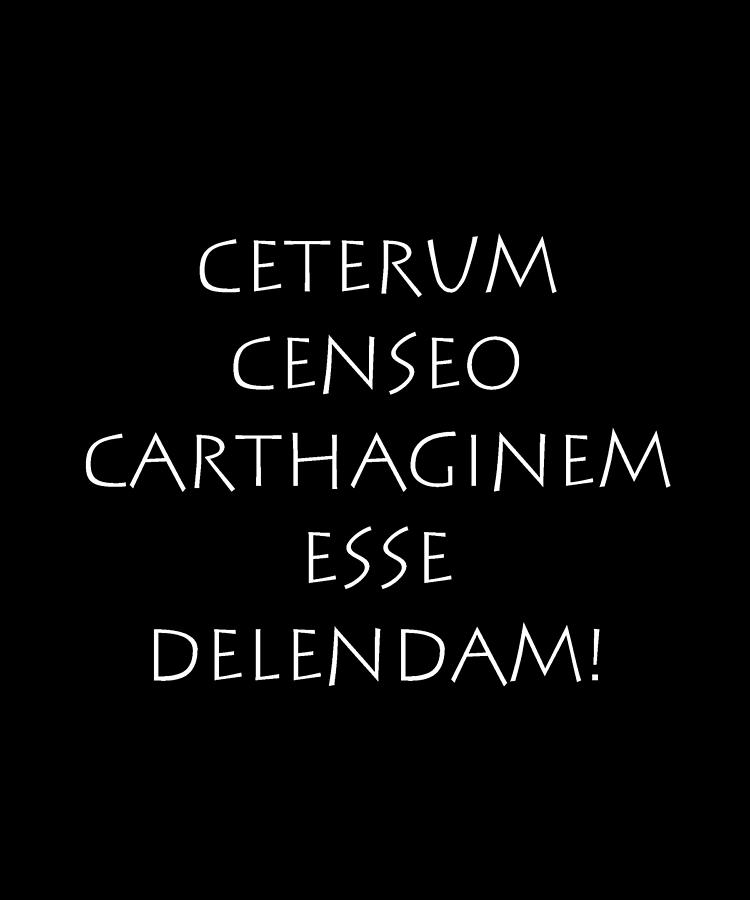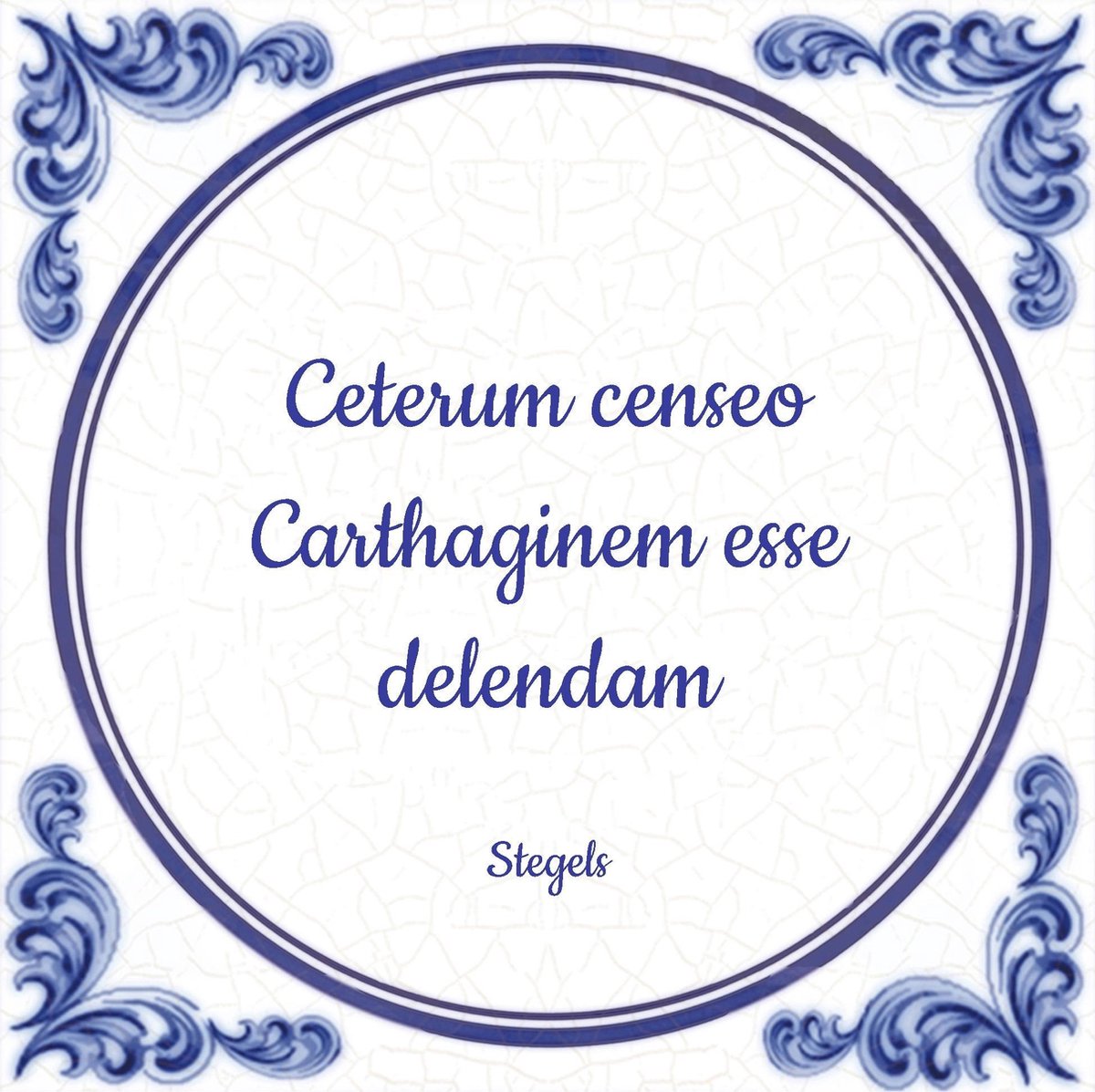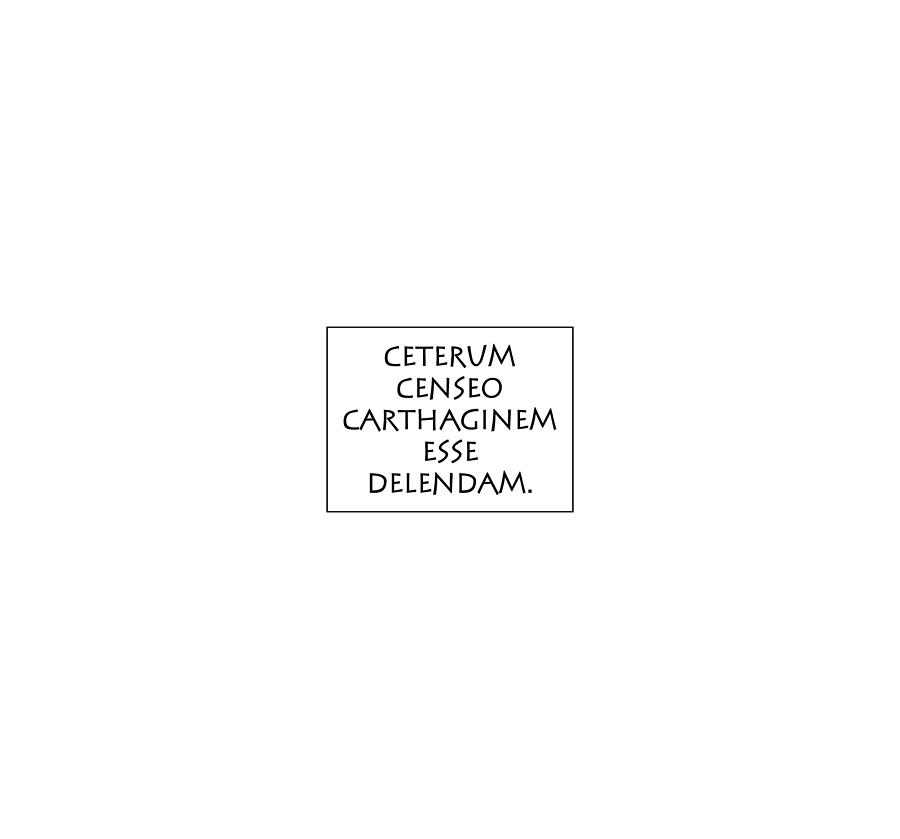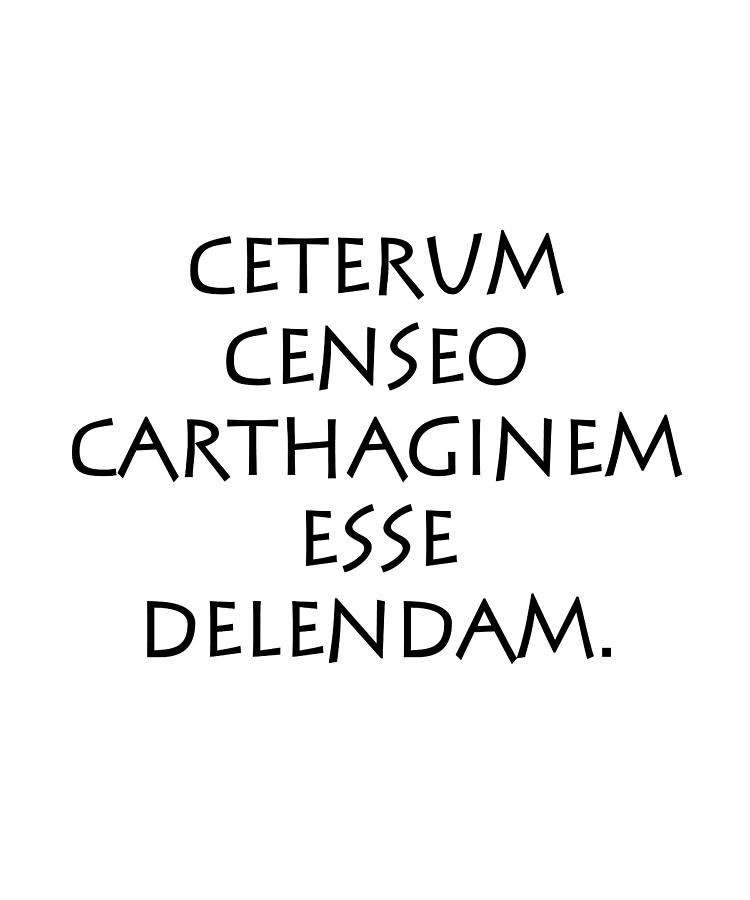
Ceterum censeo Carthaginem esse delendam Digital Art by Vidddie Publyshd Pixels
Ceterum censeo Carthaginem esse delendam. Ceterum censeo Carthaginem esse delendam (seltener ceterum autem censeo Carthaginem esse delendam; lateinisch für: „Im Übrigen bin ich der Meinung, dass Karthago zerstört werden muss") ist ein dem römischen Staatsmann Cato dem Älteren (234-149 v. Chr.) zugeschriebener Ausspruch.

Ceterum Censeo Carthaginem Esse Delendam Tile Patterns, Textures Patterns, Print Patterns
From Cato the Elder 's practice of ending every speech, no matter the topic, with ceterum censeo Carthaginem esse delendam ("furthermore, I propose that Carthage is to be destroyed"). Phrase [ edit] cēterum censeō " furthermore, I propose ": a formulaic expression used to end a speech by reinforcing one, often unrelated, major view Categories

Ceterum censeo Carthaginem esse delendam YouTube
Ceterum (autem) censeo Carthaginem esse delendam ("Furthermore, I consider that Carthage must be destroyed"), often abbreviated to Carthago delenda est or delenda est Carthago ("Carthage must be destroyed"), is a Latin oratorical phrase pronounced by Cato the Elder, a politician of the Roman Republic.

Ceterum censeo Carthaginem esse delendam Digital Art by Vidddie Publyshd Fine Art America
Book title. Statistics, science and public policy XVI : risks, rights and regulations : proceedings of the Conference on Statistics, Science and Public Policy held at Herstmonceux Castle, Hailsham, U.K., April 17-20, 2011.

Albanian traditional clothes long Jelek Ceterum Censeo Carthaginem Esse Delendam
the Curia with the words 'ceterum censeo Carthaginem esse delendam'. The motives that led Cato, who after Pydna had spoken up for the Rhodians' and apparently had quoted with approval a plea of Scipio Africanus against the destruction of Carthage after Zama,2 to urge the destruction of Carthage are part of the investigation.

Albanian Jelek/Xhamadan Ceterum Censeo Carthaginem Esse Delendam
Ceterum (autem) censeo Carthaginem esse delendam ("Furthermore, I consider that Carthage must be destroyed"), often abbreviated to Carthago delenda est or delenda est Carthago ("Carthage must be destroyed"), is a Latin oratorical phrase pronounced by Cato the Elder, a politician of the Roman Republic.

Ceterum censeo Carthaginem esse delendam. Cato. TShirt Amazon.co.uk Fashion
Ceterum censeo Carthaginem esse delendam. — Cato the Elder, message to the Roman Senate on numerous occasions — "Thousands of Roman soldiers lay there, infantry and cavalry scattered everywhere, united in a death which the blind chances of battle or flight had brought upon them. A few, whose woun

Carthage Ceterum censeo Carthaginem esse delendam! by Westwards
The phrase comes from Cato the Elder, who used this phrase in every speech to the Senate. Even when the speech had nothing to do with Carthage, he always concluded his speech with the phrase "ceterum censeo Carthaginem esse delendam" which means "Apart from that, I conclude that Carthage must be destroyed." After continued usage of this.

Ceterum censeo Carthaginem esse delendam civ
Cato the Elder (234-149 BC), the most persistent advocate in the Senate for the total destruction of Carthage, and most famously associated with repeated use, in or out of its proper context, of the phrase Delenda est Carthago. Ruins in Carthage. The location of Carthage in North Africa. " Ceterum censeo Carthaginem esse delendam ", or.

Paris 2016 Ceterum Censeo Carthaginem Esse Delendam
Because delenda is a predicative adjective in relation to the subject noun Carthago, it takes the same number (singular), gender (feminine) and case (nominative) as Carthago.[6]The fuller forms Ceterum censeo Carthaginem esse delendam and Ceterum autem censeo Carthaginem esse delendam use the so-called accusative and infinitive construction for.

Ceterum censeo Carthaginem esse delendam Grappig tegeltje student
Censeo Carthaginem esse delendam; the common English version of this. is "Carthago delenda est." Provokingly enough, I have not lighted. the original authority for either. This started me on the quest to find the original. When I. to locate the source of this saying I found that it was not easy. light on the original."

Ceterum censeo Carthaginem esse delendam Digital Art by Vidddie Publyshd Fine Art America
Ceterum censeo Carthaginem esse delendam - Apart from that, I conclude that Carthage must be destroyed. Cato the Elder | about the origin, history, Cato the.

Ceterum censeo Carthaginem esse delendam Digital Art by Vidddie Publyshd Fine Art America
ceterum censeo "unit libertatem" esse delendam. Reply reply oh_horsefeathers • Boy, my German must be worse than I thought..

"Ceterum censeo patriarchiam esse delendam" Photographic Print for Sale by Eithin Redbubble
We need not suppose that the Senate decided to destroy Carthage rather than listen any longer to Cato ending all his sententiae in the Curia with the words 'ceterum censeo Carthaginem esse delendam'. The motives that led Cato, who after Pydna had spoken up for the Rhodians and apparently had quoted with approval a plea of Scipio Africanus.

Ceterum censeo Carthaginem esse delendam! Povijest.hr
Ceterum censeo Carthaginem esse delendam. Sometimes quoted as Carthago delenda est. Moreover, I consider that Carthage should be destroyed. Cato was convinced that the security of Rome depended on the annihilation of Carthage and he urged his countrymen to the Third Punic War. Towards the end of his life he ended all of his speeches in the.

Ceterum censeo Carthaginem esse delendam! by Vyacheslav Rusyaev · Putty&Paint Punic wars
deleo is known from one of the most famous Latin quotations: Ceterum censeo Carthaginem esse delendam ("Apart from that I think Carthage must be destroyed"), presumably frequently uttered on various occasions pointedly unrelated to the conflict between Carthage and Rome by the affable Roman senator and all-around good guy, Cato the Elder;